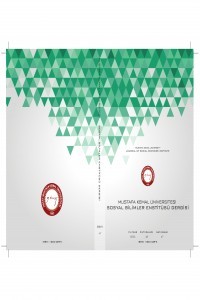Probleme Dayalı Öğrenmenin Kimya Dersinde Öğrencilerin Başarı Ve Tutumlarına Etkisinin İncelenmesi/ Effect Of The Problem Based Learning On Students' Achievement And Attitude In Chemistry
Özet Bu çalışmanın amacı, Probleme Dayalı Öğrenmenin öğrencilerin kimyaya karşı tutumlarına ve kimya dersi gazlar konusu kapsamında akademik başarıları üzerine etkisini araştırmaktır. Çalışmanın örneklemini Hatay Atatürk Lisesinde okuyan ve kimya dersi alan 52 onuncu sınıf öğrencisi oluşturmaktadır. Çalışmanın uygulaması, 2008–2009 eğitim yılının ikinci döneminde gerçekleştirilmiştir. Veriler, gazlar konusu ile ilgili bir “Başarı Testi” ve “Kimya Dersi Tutum Ölçeği” kullanılarak elde edilmiştir. Çalışmanın sonuçları Probleme Dayalı Öğrenmenin öğrencilerin akademik başarılarını ve kimyaya karşı tutum düzeyini artırdığını göstermiştir. Anahtar Sözcükler: Probleme Dayalı Öğrenme, kimya, tutum, başarı, EFFECT OF THE PROBLEM BASED LEARNING ON STUDENTS' ACHIEVEMENT AND ATTİTUDE IN CHEMISTRY Abstract The aim of this study is to investigate the effecs of problem based learning on students' atitude toward chemistry and on their academic achievement in the unit of “Gases” in the chemistry course.The sample of the study was consisted of 52 tenth year students taking chemistry course from the Atatürk Highschool, Hatay. Treatment of the study was carried out in the second semester of 2008-2009 academic year. In this study, control group pretest-posttest experimental design was used. The data was obtained with instruments which include “Achievement Test” related the unit of Gases and “Attitude Test” towards chemistry. The results of this study showed that problem based learning has improved students' academic achievement and increased students' attitude levels to chemistry. Key words: Problem Based Learning, Chemistry, Attitude, Achievement
Anahtar Kelimeler:
Probleme Dayalı Öğrenme, kimya, tutum, başarı
___
- Kaynakça
- Açıkyıldız, M. (2004). Probleme Dayalı Öğrenmenin Fizikokimya Laboratuarı Deneylerinde Etkililiğinin İncelenmesi. Yüksek Lisans Tezi, Atatürk Üniversitesi, Fen Bilimleri Enstitüsü, Erzurum, Türkiye.
- Akınoğlu, O. ve Tandoğan, R. Ö. (2007). “The effects of problem-based active learning in science education on students' academic achievement, attitude and concept learning”. Eurasia Journal of Mathematics, Science and Technology Education, 3 (1), 71–81.
- Bayrak, R. (2007). Probleme Dayalı Öğrenme Yaklaşımı İle Katılar Konusunun Öğretimi. Doktora Tezi, Atatürk Üniversitesi, Fen Bilimleri Enstitüsü, Erzurum, Türkiye.
- Benson, D. L., Wittrock, M. C. and Baur, E. M. (1993). “Students' Preconceptions of The Nature of Gases”, Journal of Research Science Teaching, 30, 587-597.
- Bodner, G. M. (1986). Constructivism: A theory of Knowledge, Journal of Chemical Education, 63, 873-878.
- Campbell, D. T., & Stanley J. C. (1963). Experimental and Quasi-Experimental Designs For Research. Chicago: Rand McNally & Company
- Duch, B. J., Groh, S. E. and Allen, D. E. (2001). Why problem-based learning? A case study of institutional change in undergraduate education. The Power of Problem-Based Learning, Eds: Duch, B. J., Groh, S. E. and Allen, D. E., Sterling, Virginia, 3-11.
- Gallagher, S. A., Stepien, W. J., Sher, B. T. & Workman, D. (1995). “Implementing problem-based learning in science classrooms”. School Science and Mathematics, 95(3), 136–146.
- Nakhleh, M. B. (1994). “How Can Research Uncover What Students are Learning?” Journal of Chemistry Education, 71, 201-205.
- Novick, S. & Nussbaum, J. (1981). “Pupils' understanding of the Particulate Nature of Matter: A Cross-Age Study”, Science Education, 65, 197-196.
- Peterson, R. F., & Treagust, D. F. (1998). “Learning to teach primary science through problem-based learning”. Science Education, 82(2), 215–237.
- Pınarbaşı, T. (2002). Çözünürlükle İlgili Kavramların Anlaşılmasında Kavramsal Değişim Yaklaşımının Etkinliğinin İncelenmesi. Yayınlanmamış Doktora Tezi, Atatürk Üniversitesi, Erzurum.
- Ram, P. (1999). “Problem-Based Learning in Undergraduate Education”. Journal of Chemical Education, 76, 1122-1126.
- Savery, J. R. (2006). “Overview of problem-based learning: Definitions and distinctions”. The Interdisciplinary Journal of Problem-based Learning, 1 (1), 9–20.
- Selco, J. I., Roberts, J. L. & Wacks, D. B. (2003). “The Analysis of Seawater: A Laboratory-Centered Learning Project in General Chemistry”. Journal of Chemical Education, 80, 54-57.
- Soderberg, P., & Price, F. (2003). “An examination of problem-based teaching and learning in population genetics and evolution using” EVOLVE, a computer simulation. International Journal of Science Education, 25(1), 35–55.
- Springer, L., Stanne, M. E. & Donovan S. S. (1999). “Effects of small-group learning on undergraduates in science, mathematics, engineering, and technology: A meta-analysis”. Review of Educational Research, 69 (1), 21-51.
- Stavy, R. (1998). “Children's Conception of Gas”, International Journal of Science Education, 10, 553-560.
- Sungur, S. & Tekkaya, C. (2006). “Effects of problem-based learning and traditional instruction on self-regulated learning”. The Journal of Educational Research, 99 (5), 307–317.
- Sungur, S., Tekkaya, C.& Geban, Ö. (2006). “Improving achievement through problem-based learning”. Journal of Biological Education, 40 (4), 155–160.
- Şenocak, E. (2005). Probleme Dayalı Öğrenme Yaklaşımının Maddenin Gaz Hali Konusunun Öğretimine Etkisi Üzerine Bir Araştırma. Doktora Tezi, Atatürk Üniversitesi, Fen Bilimleri Enstitüsü, Erzurum, Türkiye.
- Tavukcu, K. (2006). Fen Bilgisi Dersinde Probleme Dayalı Öğrenmenin Öğrenme Ürünlerine Etkisi. Yüksek Lisans Tezi, Zonguldak Karaelmas Üniversitesi Sosyal Bilimler Enstitüsü, Zonguldak, Türkiye.
- Tatar, E. (2007). Probleme Dayalı Öğrenme Yaklaşımının Termodinamiğin I. Kanununu Anlamaya Etkisi, Doktora Tezi, Atatürk Üniversitesi, Fen Bilimleri Enstitüsü, Erzurum, Türkiye
- Visser, Y. L. (2002). “Effects of problem-based and lecture-based ınstructional strategies on problem solving performance and learner attitudes in a high school genetics class”. The 2002 Annual Meeting of the American Educational Research Association, New Orleans, LA. http://www.learndev.org/dl/aera-pbl-ylv.pdf (01.02.2010).
- Walker, J. T. (2001). The Effect of a Problem Based Learning Curriculum on Students' Perceptions About Self Directed Learning, Unpublished Phd Thesis, The University of Mississippi.
- Webster, A., A., & Ringss, R. M. (2006). “A Quantitative Assessment of a Medicinal Chemistry Problem-based Learning Sequence”. Am J Pharm Education, 70 (4): 89.
- Ying, Y. (2003). “Using Problem-Based Teaching and Problem-Based Learning to Improve The Teaching of Electrochemistry”, The China Papers, July, 42-47.
- Başlangıç: 2004
- Yayıncı: Hatay Mustafa Kemal Üniversitesi
Sayıdaki Diğer Makaleler
Yöneticiler Ve Öğretmenler Arasındaki Güç Mesafesi/ Power Dıstance Between Managers And Teachers
Suad Gümüş, Gretchen BUTERA, Lisa Anne HUMPHREYS
Zeynep Hatunoğlu, İsmail Bakan
1980-2000 YILLARI ARASINDA TÜRK ROMANINDA ÇAĞDAŞLAŞMA VE EĞİTİM SORUNU
